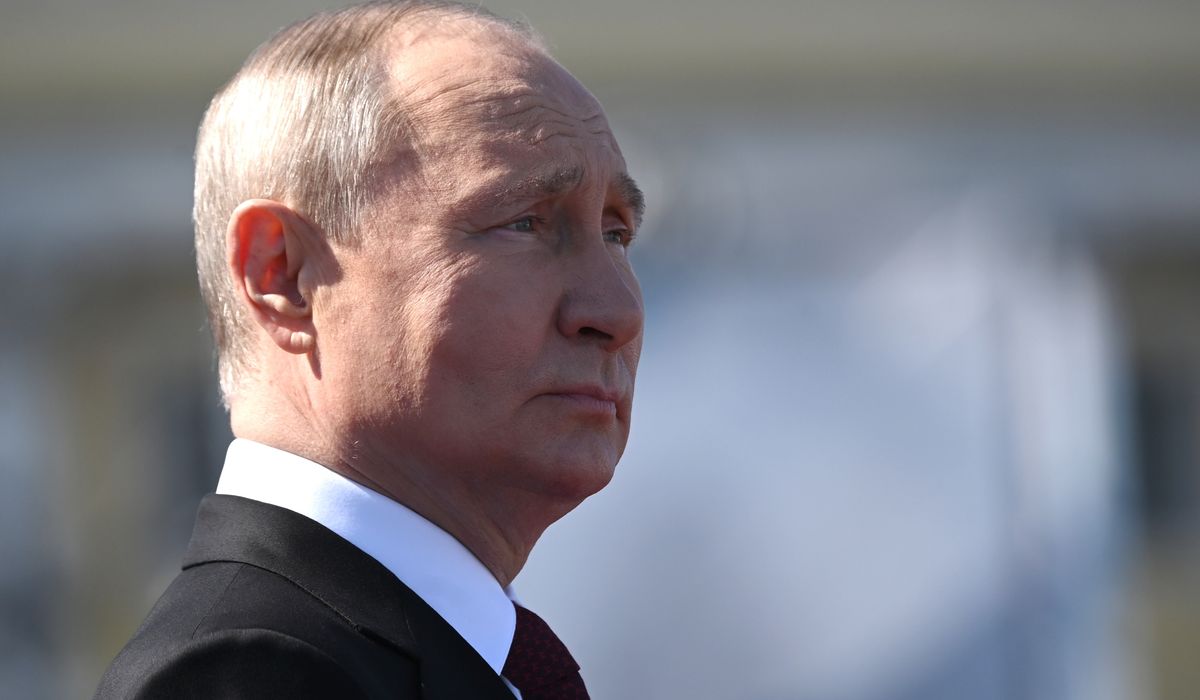Low-wattage Africa summit shows the limits of Putin’s appeal

JOHANNESBURG, South Africa — It was one of the Kremlin’s biggest diplomatic showpieces since the invasion of Ukraine nearly 18 months ago, but it’s not clear Russian President Vladimir Putin made much headway after welcoming a slew of African leaders to last week’s highly touted summit in St. Petersburg.
Mr. Putin appeared no closer to winning fresh support for his invasion of Ukraine as the summit wound down over the weekend. Even the guest list told a disappointing tale: The inaugural summit Mr. Putin staged in Sochi in 2019 — before the Ukraine war — attracted 43 African heads of government, but this year just 17 made the trip.
Still, two leading economies — South Africa and Egypt — had their presidents at the table, even as the competition for friends and influence on the continent heats up between the West, Russia and China. The leaders of Kenya and Nigeria declined to come, as did President George Weah of Liberia, who has spoken repeatedly against the invasion of Ukraine.
The disappointing turnout clearly stung.
Kremlin spokesman Dimitry Peskov blamed the unimpressive turnout on “unconcealed brazen interference” by the U.S., France and NATO allies via their embassies across Africa. The West “put pressure on the leadership of these countries in order to prevent their active participation in this forum,” Mr. Peskov complained.
The U.S. and its allies have imposed a string of sanctions on Moscow for the Ukraine war and there is a fierce bidding war among nonaligned nations to condemn the war.
One of the key missions of the most recent summit was to restart the Black Sea Grain Initiative under which Russia would not stop the movement of corn and wheat from Ukraine to Africa via the Black Sea ports. After an initial nod, Mr. Putin withdrew from the deal.
In his opening speech Thursday, he said Russia would supply free grain to some of the continent’s poorest nations including Burkina Faso, Zimbabwe, Mali, Somalia, the Central African Republic (CAR) and Eritrea. All the named recipients are under authoritarian rule or, as in the case of Mali and CAR, propped up by Russia’s own mercenary Wagner Group. Zimbabwe’s 2018 elections were not recognized by the United States, Canada and much of Europe after observers noted irregularities and the intimidation of voters.
Zimbabwe goes to the polls again on Aug. 23 and the opposition Citizens Coalition for Change has had most of its rallies banned by police. Zimbabwe President Emmerson Mnangagwa has been vocal in his support of Mr. Putin, and at the summit pledged “solid collaboration between our two countries,” and “solidarity with your special operation in Ukraine.”
Despite high levels of hunger and poverty at home, South African newspapers reported that Mr. Mnangagwa chartered a jet to carry him and his entourage to St. Petersburg at a cost of $700,000. Mr. Putin presented him with the gift of a Russian helicopter.
Whereas in Soviet days, Angola was viewed as a client-state of Moscow — its government kept in power only with the help of Cuban troops — the former Portuguese colony now votes against Russia at the United Nations.
Struggling for a foothold
Mr. Putin told delegates the summit would “boost our political and humanitarian partnership for many years to come”, and he praised Africa for “asserting itself more and more confidently.” But where China, France, Britain, India and the United States all have strong business ties, Moscow has struggled to gain a foothold. U.S. trade with South Africa alone is close to Russia’s tally with the entire continent.
The Ukraine war has clearly closed off diplomatic options for Russia, a situation the summit did little to address, at least publicly, with key countries such as South Africa.
In June, South African President Cyril Ramaphosa of South Africa led a peace mission to Kyiv and Moscow in an effort to end the war in Ukraine, but his proposal was largely ignored. And in August, President Putin was due in Johannesburg for a summit of rising powers, but canceled when it became clear South Africa’s government may have been obligated to arrest him under a warrant from the International Criminal Court at the Hague.
Unstable nations that have fallen out of favor with the West over coups, wars and abuse of human rights may offer Moscow a way in.
Eritrea on the Horn of Africa is rated by Amnesty International as among the most repressive states in the world. And military regimes in Burkina Faso and Niger have yet to show where their allegiance may lie. If Zimbabwe’s elections later this month turn violent or face legitimacy questions, a cold shoulder from the U.S. and Europe could see Russia boost its diplomatic presence.
Photos from last week’s summit captured a major exhibit of Russian weapons on display for the invitees to inspect, a measure of one market where Russia remains a major supplier for African countries.
But opinion polls across Africa show little support for Moscow. And while Mr. Putin maintains his reluctance to travel, it seems unlikely he will make reciprocal visits to any of the attending nations.
In St. Petersburg, Mr. Ramaphosa said Africa stood ready to host and adjudicate a peace between Russia and Ukraine but both sides have put more weapons and troops in the field in recent days, suggesting neither is in mood to back down.
Rather, Mr. Putin will have to wait for the next U.N. motion on the war to see whether any African delegates vote in his favor.
Mr. Putin’s outreach is not a surprise: Africa’s nations make up the largest voting bloc at the United Nations and have repeatedly split their votes on General Assembly resolutions criticizing Russia’s actions in Ukraine.

